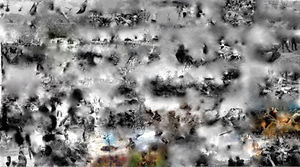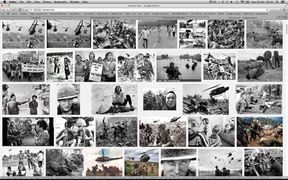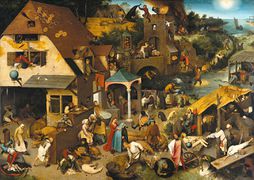Unintended Images: Difference between revisions
No edit summary |
No edit summary |
||
| Line 1: | Line 1: | ||
{{Graduation work | {{Graduation work | ||
|Creator=Artyom | |Creator=Artyom Kocharyan | ||
|Date=2015 | |Date=2015 | ||
|Bio=Artyom Kocharyan (AM) is visual artist based in Rotterdam. His work explores the | |Bio=Artyom Kocharyan (AM) is a visual artist based in Rotterdam. His work explores the peculiarities of current image culture, namely the relationship between images and technology that encompasses them. Artyom’s work examines the new dynamics of images that have been immerged within the culture of ‘digital’ and ‘online’. | ||
|Thumbnail=Vietnam-3.jpg | |Thumbnail=Vietnam-3.jpg | ||
|Website=www.artyomkocharyan.com | |Website=www.artyomkocharyan.com | ||
|Description=Artyom | |Description=Artyom’s work entitled “Broken Images” is a series of digital paintings that are based on search results of Google Images. In his work Artyom examines the dynamics of current image culture, namely their multiplicity within the online world. | ||
As a result of image proliferation the online world become a space where images appear to their viewer within multiplicity. Google’s image search is a prime example of this phenomenon. By gathering multiple images inside one space, Google creates a new ‘large image’ that is being framed within our screens. However as a tool that is intended to find single images, Google disregards the aesthetics form of those ‘large images’ it creates. It arranges individual images within the search result according to their relevance to the topic rather then their visual coherence with each other. As a result those images appear as ‘broken’ and fragmented, and refuse to be read as a single image. | |||
Artyom’s work reflects on the incoherence that comes with the multiplicity of images. He uses screenshots of different Google search result, which he manipulates within Photoshop by using ‘healing’ and ‘patching’ tools. For his series Artyom drew inspiration from several paintings, particularly those of Pieter Bruegel the Elder, which regardless of their overcrowded and noisy aesthetics manage to remain their wholeness as an image. Those paintings took into account the gaze of the viewer, providing pathways through which the human eye could travel and explore the image. Similar Artyom’s work attempts to rehabilitate those ‘broken’ images and reintroduce a coherence that would allow them to be read as a whole. | |||
Artyom’s work reflects on the incoherence that comes with the multiplicity of images. He uses screenshots of different Google search result, which he manipulates within Photoshop by using ‘healing’ and ‘patching’ tools. For his series Artyom drew inspiration from several paintings, particularly those of Pieter Bruegel the Elder, which regardless of their overcrowded and noisy aesthetics manage to remain their wholeness as an image. Those paintings | |||
}} | }} | ||
<gallery mode="packed-hover"> | <gallery mode="packed-hover"> | ||
Revision as of 20:49, 21 May 2015
| Unintended Images | |
|---|---|
| Creator | Artyom Kocharyan |
| Year | 2015 |
| Bio | Artyom Kocharyan (AM) is a visual artist based in Rotterdam. His work explores the peculiarities of current image culture, namely the relationship between images and technology that encompasses them. Artyom’s work examines the new dynamics of images that have been immerged within the culture of ‘digital’ and ‘online’. |
| Thumbnail | |
| Website | www.artyomkocharyan.com |
Artyom’s work entitled “Broken Images” is a series of digital paintings that are based on search results of Google Images. In his work Artyom examines the dynamics of current image culture, namely their multiplicity within the online world.
As a result of image proliferation the online world become a space where images appear to their viewer within multiplicity. Google’s image search is a prime example of this phenomenon. By gathering multiple images inside one space, Google creates a new ‘large image’ that is being framed within our screens. However as a tool that is intended to find single images, Google disregards the aesthetics form of those ‘large images’ it creates. It arranges individual images within the search result according to their relevance to the topic rather then their visual coherence with each other. As a result those images appear as ‘broken’ and fragmented, and refuse to be read as a single image.
Artyom’s work reflects on the incoherence that comes with the multiplicity of images. He uses screenshots of different Google search result, which he manipulates within Photoshop by using ‘healing’ and ‘patching’ tools. For his series Artyom drew inspiration from several paintings, particularly those of Pieter Bruegel the Elder, which regardless of their overcrowded and noisy aesthetics manage to remain their wholeness as an image. Those paintings took into account the gaze of the viewer, providing pathways through which the human eye could travel and explore the image. Similar Artyom’s work attempts to rehabilitate those ‘broken’ images and reintroduce a coherence that would allow them to be read as a whole.



